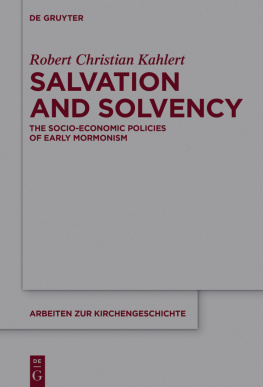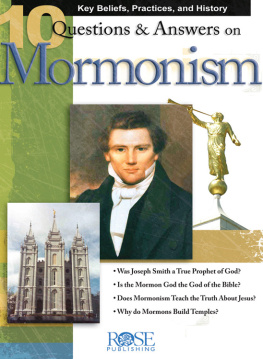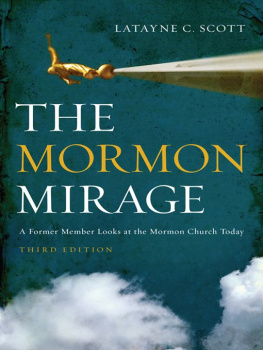Salvation and Solvency
Guide

Robert Christian Kahlert
Salvation and Solvency
Arbeiten zur Kirchengeschichte

Founded by
Karl Holl and Hans Lietzmann
Edited by
Christian Albrecht and Christoph Markschies
Band 133

Every effort has been made to trace copyright holders and to obtain their permission for the use of copyright material. The author apologizes for any errors, omissions or misattributions and would be grateful if notified of any corrections that should be incorporated in future versions of this monograph.
ISBN 978-3-11-047020-8
e-ISBN (PDF) 978-3-11-047347-6
e-ISBN (EPUB) 978-3-11-047267-7
ISSN 1861-5996
Library of Congress Cataloging-in-Publication Data
A CIP catalog record for this book has been applied for at the Library of Congress.
Bibliographic information published by the Deutsche Nationalbibliothek
The Deutsche Nationalbibliothek lists this publication in the Deutsche Nationalbibliografie;detailed bibliographic data are available on the Internet at http://dnb.dnb.de.
2016 Walter de Gruyter GmbH, Berlin/Boston
www.degruyter.com
Acknowledgements
A work some fifteen years in the making incurs even more debts than the usual dissertation does.
My Doktorvater Univ.-Prof. em. Dr. Wolfgang Wischmeyer, Department of Church History and Christian Archaeology, Faculty of Protestant Theology at the University of Vienna, started out as second reader on an earlier dissertation proposal but adopted me after the unfortunate death of my first advisor. Prof. Wischmeyer helped me transition to a topic of especial interest to me, Fernand Braudel. He patiently waited over a decade for me to get my plate clean enough to take on this task and grandfathered me over into his well-deserved emeritus status. He read my drafts with uncanny speed and provided gentle but penetrating feedback. I cannot thank him enough.
Thanks are equally do to Univ.-Prof. em. Dr. Dr.hc. Friedrich-Wilhelm Graf, of the Faculty of Protestant Theology at the University of Munich, who took on the difficult task of the outside reviewer.
I am grateful to Professors Christian Albrecht, Munich, and Christoph Markschies, Berlin, for giving me the opportunity to publish my dissertation in their monograph series. Dr Stefan Selbman and Nancy Christ of DeGruyter Berlin took me under their wings and led me through the thicket of the publication process; many thanks for their care and circumspection.
At the Faculty of Protestant Theology at the University of Vienna, the doctoral colloquium organized by Ao.Univ.-Prof. Dr. Robert Schelander provided a supportive context for presenting work-in-progress and receiving early feedback on ideas. I found the questions and suggestions of Dr Schelander, Kerstin Bhm, Sonja Danner, Marianne Fliegenschnee, Bernhard Kirchmeier, Naomi Miyazaki, Elizabeth Morgan, Katharina Payk and Violet al-Raheb especially helpful. Special mention must be made of the essay collection that Bernhard Kirchmeier edited; his invitation to participate provided a forcing function for writing up the nucleus of my dissertation argument in the late spring of 2014.
Among my many friends in the United States, who participated in the incubation period of this task, foremost is fellow Lutheran Benjamin Paul Rode. Ben suggested that I should write about early Mormonism, the quintessential American religion. Ben supported the project throughout, discussing issues of mental models, historiography, Biblical scholarship, and religious study with me, whether over lunch in Austin, or later via Skype in Europe. Ben has a knack for taking my garbled thought fragments and pulling them together into a coherent argument. I am grateful for all of his support and friendship.
Jennifer Cooper (ne Sullivan) was a great partner in crime on my historiographical research efforts. Whether Norse mythology, Biblical studies, the Salem witch trials, the Spanish Armada, American Slavery or the Civil Warif it was historical, she was an enthusiastic collaborator. Her thesis on historical fallacies clarified some of the issues in historical argumentation checking.
Kean Kaufmann enthusiastically kept tabs on my Germanisms. We split the work evenly: She proofed the entire dissertation, while the remaining errors are mine.
My employer during the incubation period, Doug Lenat, CEO of Cycorp Inc, was continuously supportive of my historiographical research efforts. He made time to discuss them as often as he could, and helped with my research grant proposal efforts.
Doug also assisted by forming and keeping together a team of artificial intelligence researcherscomputer scientists, philosophers and linguistswho taught me most of what I now know about knowledge representation and its relationship to natural language. Though the majority of them shared neither my fascination with historiography nor my Christian interests, my colleagues were interested in the problems and ready to discuss them. Keith Goolsbey, Pace Smith and Nick Siegel went out of their way to support my efforts. In addition to the collaborations already mentioned, I am deeply grateful for discussions with my past and present colleagues Mark Abrams, Stefano Bertolo, Mike Brown, Jon Curtis, Chris Deaton, Amy Drummond, Julie Fitzgerald, Beth Huffer, Bill Jarrold, Charles Klein, Larry Lefkowitz, Chynthia Matuszek, Chris Mlsna, Deborah Nichols, Kathy Panton, Mike Pool, Nancy Salay, Dave Schneider, Blake Shepard, Matt Taylor, Amanda Vizedom and Michael Witbrock.
Along the road of learning ever more about American history, Bill Woodburn was a constant companion; I miss our breakfast discussions about the Civil War and the Salem witch trials, two events that nicely sandwich the time period of early Mormonism.
My parents have been unstintingly supportive, in word and in deed, of my interests and efforts ever since I can remember. They supported this work by taking in the children when I needed to be at the university, and taking me in when the children needed to be children. Many of the dissertation parts that I am most pleased with were written in their guest room.
My mother-in-law donated a weekend of her time to help with the arduous task of lining up the French and the English edition of Braudels Mediterranean ; I am very grateful for her hard and diligent work.
Late in the publication process, Boris Valentinitsch rode to the rescue and converted the main city maps to a printer-friendly vector-graphic format. His graphical support is much appreciated.
Finally, I dedicate this work to my wife Rahel and our children Faith and Steven, in the twin hopes that a clearer understanding of the past will lead to a better future for my children, and that whatever part of this future I live to see, Rahel will share with me.
List of Figures
)
)
)
)
List of Tables
)
)
)
)
Abbreviations
| BYU | Brigham Young University, Provo, Utah |
| CB | Christian Baptist |
| CHL | Church History Library, Salt Lake City, Utah |
| D&C | Doctrines and Covenants |
| GGB | Geschichtliche Grundbegriffe |
| HC | History of the Church |
|












